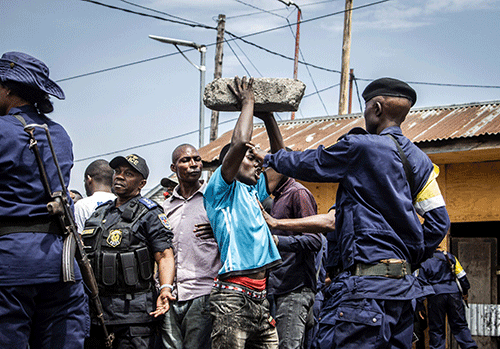President Hage Geingob has called for an immediate stop to hostilities in the eastern Democratic Republic of Congo where fighting between government troops and rebels have led to the displacement of thousands.
Tensions in the region have reached a boiling point with the DRC government ordering a Rwandan ambassador to leave the country within 48 hours last week after Kinshasa accused Rwanda of supporting M23 rebels.
Now in his capacity as chairperson of the SADC Organ on Politics, Defence and Security, President Hage Geingob held telephonic talks with both leaders of DRC and Rwanda over the escalating conflict.
During his call with Félix Tshisekedi of DRC and Rwanda’s Paul Kagame, Geingob affirmed the position taken by the international community by appealing for calm as well as an immediate ceasefire in the region.
“In consultation with other troika members, former chairman of the organ, President Cyril Ramaphosa of the Republic of South Africa, and incoming chairperson of the organ, President Hakainde Hichilema, President Geingob reaffirms SADC’s support for the mediation led by the Chairman of the International Conference on the Great Lakes Region (ICGLR), President João Manuel Gonçalves Lourenço of the Republic of Angola,” the Presidency said in a statement yesterday.
“President Geingob is pleased with the commitment of President Kagame and President Tshisekedi to the Luanda and Nairobi processes to give peace a chance by finding lasting solutions to the security challenges in Eastern DRC.”
SADC is also committed to continue playing a supporting and constructive role in order to strengthen conditions of peace in eastern DRC.
“Following the meeting of the SADC organ troika in Maseru, Lesotho on 28 October 2022, the leaders of the organ pledged to further work with the authorities in Kinshasa, the United Nations and MONUSCO to ensure the effectiveness of the Force Intervention Brigade.”
Xinhua reported early this week that over the past two weeks, about 50 000 people were displaced, including around 12 000 who sought safety in neighbouring Uganda.
The M23 was formed in 2012, claiming to defend the interests of Congolese Tutsis, a group sharing the ethnicity of Rwanda’s President Paul Kagame, against Hutu armed groups, seizing Goma, the largest city in DRC east, the same year. After a peace deal in 2013, many M23 fighters were integrated into the national military, according to Al Jazeera.
The group resumed fighting in late 2021 after lying dormant for years, accusing the government of having failed to honour an agreement over the demobilisation of its fighters. It has since captured swathes of territory in North Kivu, including the key town of Bunagana on the Ugandan border in June.
Caption


